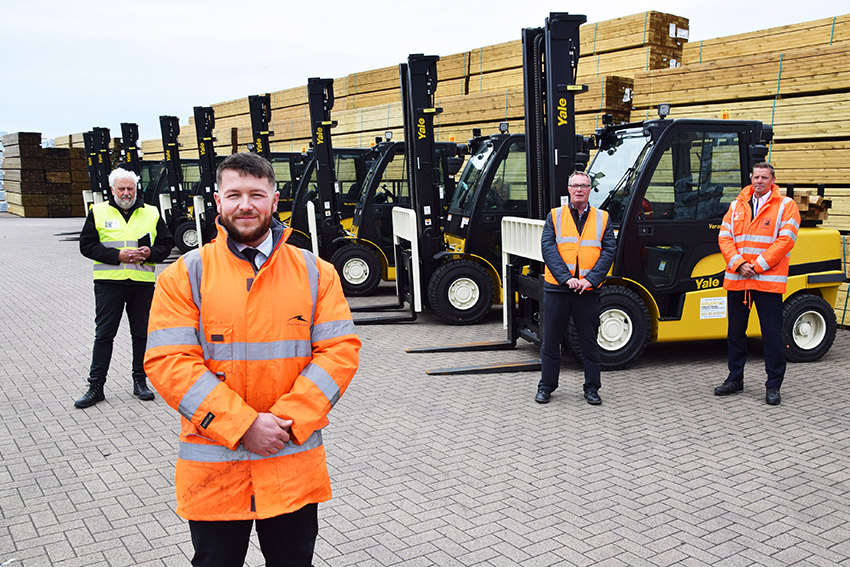Shoreham Port has bought a £2 million fleet of new forklift trucks to move timber – one of the main materials handled at the harbour.
The 35 Yale Veracitor trucks can lift up to 5.5 tonnes at a time and will be used to load about 70 lorries a day, the port said.
Like other operational equipment at the harbour, the new forklift fleet will be fuelled with a low-emission gas-to-liquid (GTL) fuel recently acquired by the port.
GTL is biodegradable and results in less odour, smoke and engine noise than conventional diesel fuel, the port said, “creating a better working environment for the Shoreham Port team and the wider local community”.
The port said that it handled about 20 per cent of all Britain’s timber imports, with 450,000 square metres handled and stored last year.
It is the biggest timber handling port on the south coast and has 47,000 square metres of dedicated, modern dry warehousing as well as quayside paved open storage.
Most of the timber that comes through Shoreham’s lock gates is FSC and PEFC certified and has been shipped from the sawmills of Scandinavia and the Baltic countries of Latvia and Russia.
Both the FSC (Forest Stewardship Council) and PEFC (Programme for the Endorsement of Forest Certification) aim to provide a global certification system to enable customers to identify and purchase wood from well-managed forests – in keeping with Shoreham’s “EcoPort” status.
And the port has a unique “Track-A-Pack” stock control system so that customers can view real-time information about their stock.
The system tracks each pack of timber from the moment when it lands at Shoreham to the moment when it leaves on a vehicle.
The port’s operations and training manager Tom Rawlins said: “The forklift truck fleet is essential to ensure our port operatives can turn every ship around efficiently.
“Our Yale trucks pick up the timber packs as they are discharged, transport them to the barcode area and then on to storage across the 2.5km length of the port.
“We are very proud of the part that Shoreham Port has to play in the UK timber supply chain and the Yale forklift trucks are an essential part of the journey providing efficiency, reliability and excellent environmental performance.”
The £2 million contract was the biggest ever for specialist supplier Solent Forklift Trucks, part of Forkway Group.
The port bought its previous Yale fleet from the same company. Solent’s general manager Ray Berry said: “The Stage V engine under the hood provides even greater fuel savings across the fleet compared to the previous model.
“For the drivers, the cloth seats with air suspension and HydraSmooth hydraulic accumulator help keep vibrations to a minimum.
“The full steel cab is a comfortable bubble for the operator with low noise levels.”
The trucks are designed to withstand the variety of challenging weather conditions experienced at the port, from summer heat and gale force winds to driving rain and to freezing sub-zero temperatures.
The port said that safety had the highest priority so a team carried out a full assessment of operations, reviewing all hazards and risks.
Mr Rawlins said: “The port’s processes were already at optimum levels but there was more that could be done to the trucks thanks to a new generation of safety technologies available.
“Pedestrian segregation and the safety of colleagues is crucial so every truck has left and right red perimeter lights, a rear blue spot light, two cab-mounted work LED lights and mast-mounted LEDs fitted along with a white noise reversing buzzer and an operating beacon.”









As somebody who has often had recourse to the Harbour for supplies of wood to create bookshelves, I am surprised that there is not a series of comments by now beneath this article which is surely the epitome of geekishness. It is heartening to hear about the Stage V engine, and the fact that drivers have a cushioned seat. Surely this could be heated in the winter months? We need a series about the details of forklift trucks’ evolution. This has the makings of a cult to rival sheds. But this is article is a start. Well done, Frank.
As a carpenter, I was very pleased to read this article.
The idea that my local port brings in 20% of the timber we use in the UK is pretty exciting for me.
In fact I’ll be thinking of this tomorrow, with some pride, as I finish the decking job I’m on at the moment.
It’s also good to know where the trees were grown, and in a sustainable way.
Perhaps someone can direct this article to Mr West, high priest of our local cult. This is the way to go if you’re properly green – rather than holding up the working world and creating traffic jams with unused or duplicated cycle lanes.